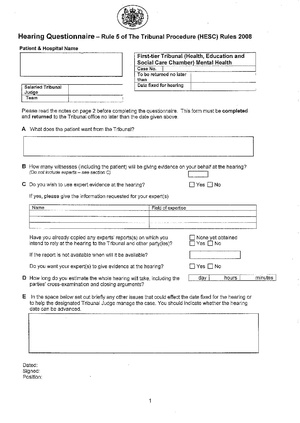Mental Health Tribunal hearing questionnaire (27/4/09): Difference between revisions
m (Jonathan moved page Mental Health Tribunal hearing questionnaire to Mental Health Tribunal hearing questionnaire (27/4/09)) |
No edit summary |
||
| Line 1: | Line 1: | ||
{{Resource | |||
|Title=Hearing Questionnaire | |||
==See also== | |Author=Mental Health Tribunal | ||
|Date=2009/04/27 | |||
|Type=Tribunal form | |||
|Sentence=Old hearing questionnaire | |||
|Abstract=The Mental Health Tribunal in England began using a hearing questionnaire on 27/4/09 but its use has died out (new forms are the subject of consultation). It was used in restricted cases and sent out with the letter confirming the hearing date. It was used by the full-time presidents for case management purposes, especially in relation to the use of independent evidence and avoiding postponements once the hearing has been listed. If the questionnaire was not returned then directions could be issued. There is a duty to "co-operate with the Tribunal generally" in [[Tribunal rule 2]](4). | |||
|Detail===See also== | |||
[[Mental Health Tribunal]] | [[Mental Health Tribunal]] | ||
|Saved=No | |||
|Download=MHT questionnaire.pdf | |||
= | |News=No | ||
|RSS pubdate=2021-4-10 08:04:55 AM | |||
}} | |||
Revision as of 08:04, 10 April 2021
Old hearing questionnaire The Mental Health Tribunal in England began using a hearing questionnaire on 27/4/09 but its use has died out (new forms are the subject of consultation). It was used in restricted cases and sent out with the letter confirming the hearing date. It was used by the full-time presidents for case management purposes, especially in relation to the use of independent evidence and avoiding postponements once the hearing has been listed. If the questionnaire was not returned then directions could be issued. There is a duty to "co-operate with the Tribunal generally" in Tribunal rule 2(4).
See also
Type: Tribunal form🔍
Title: Hearing Questionnaire
Author: Mental Health Tribunal🔍
Date: 27 April 2009🔍
What links here:
